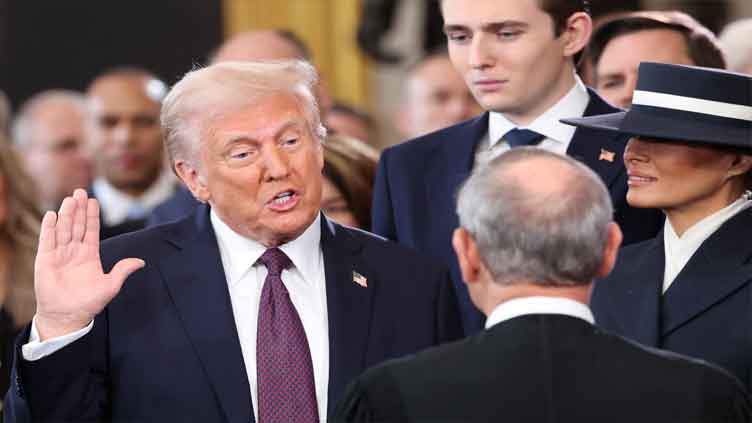Back in White House: Trump sworn in as 47th US president

World
He expressed confidence that the US would prosper again and regain respect worldwide.
US Supreme Court Chief Justice John Roberts administers oath of office to President Trump
Inauguration ceremony was held indoors for first time in 40 years due to severe cold
Trump says his administration will tackle inflation caused by overspending and rising energy costs
WASHINGTON (Dunya News) – Donald Trump took oath as the 47th US president at a ceremony marked by pomp and show.
The new entrant to White House plays a pivotal role in shaping the future of one of the oldest democracies and his decisions have far-reaching impact in the world.
This is the second time Trump will be in the saddle – this time after defeating Kamala Harris in the trumpeted 2024 presidential election.
Chief Justice John Roberts of the US Supreme Court administered the oath of office to President Trump.
Before the ceremony, Trump met President Biden at the White House and attended a prayer service at a Washington church alongside his wife, Melania Trump.
Due to severe cold weather in Washington, DC, the inauguration ceremony was held indoors for the first time in 40 years.
In his opening remarks, Trump thanked his predecessor and Vice President Kamala Harris, declaring, “The golden age of America begins right now.”
He expressed confidence that the US would prosper again and regain respect worldwide.
Read also: Trump poised to launch sweeping border crackdown, ramp up deportations
Trump pledged that his administration would not allow the nation to be taken advantage of, vowing, “Every single day of the Trump administration, I will simply put America first.”
He promised to “reclaim” the sovereignty of the U.S., ensure safety, and “rebalance” the scales of justice.
Trump stated that his top priority was to build a free, proud, and prosperous nation, proclaiming, “America will soon be greater, stronger, and far more exceptional than ever before.”
He said, “We are at the start of a thrilling new era of national success,” and emphasizing that a “tide of change is sweeping the country,” with America poised to seize this unprecedented opportunity.
Outlining his plans for executive orders, Trump pledged to initiate the "complete restoration of America and a revolution of common sense."
He announced his intent to declare a “national emergency” at the southern border, halting illegal entry and beginning the process of deporting “millions of criminal aliens.”
He vowed to reinstate the “remain in Mexico” policy, end “catch and release,” and deploy troops to the border to combat what he described as a “disastrous invasion.” Additionally, he pledged to designate cartels as foreign terrorist organizations.
Addressing the economy, Trump said his administration would tackle inflation caused by overspending and rising energy costs. Declaring a “national energy emergency,” he promised to maximize the use of America’s fossil fuel reserves, lower energy prices, refill strategic reserves, and export energy globally.
Trump introduced the idea of an “External Revenue Service” to impose tariffs and taxes on foreign countries rather than U.S. citizens, promising this would generate significant revenue and revive the American Dream.
On free speech and censorship, Trump condemned previous government restrictions, pledging to sign an executive order to end all censorship and protect free expression. He committed to restoring impartial justice, ensuring the state would never again be weaponized against political opponents.
Trump also addressed social policies, declaring the government would adopt a merit-based, color-blind approach and officially recognize only two genders: male and female.
He pledged to reinstate service members expelled for refusing Covid-19 vaccine mandates and end “radical political theories and social experiments” in the military, focusing instead on building the “strongest military in history.”
On foreign policy, Trump stated that the Gulf of Mexico would be renamed the Gulf of America, the Panama Canal would be reclaimed, and America would pursue its “manifest destiny” by launching astronauts to Mars to plant the flag.
Reflecting on his political comeback, Trump declared, “Many thought it was impossible, but here I am. The American people have spoken, proving that in America, the impossible is what we do best.”
Trump concluded by describing his legacy as one of a peacemaker and unifier, celebrating the return of hostages from the Middle East as evidence of his commitment to diplomacy and national success.
THE DISTINGUISHED GUESTS
A diverse lineup of foreign dignitaries, including close allies of Donald Trump and even some of his adversaries, attended the ceremony.
Reports say invitations have been extended to seven sitting heads of state and two former leaders.
According to Reuters, the event is expected to draw an estimated 500,000 attendees.
Read also: Who are invited, not invited, to world's top office bearer's inauguration
Among the dignitaries will be Chinese President Xi Jinping, Argentina’s President Javier Milei, Italy’s Prime Minister Giorgia Meloni, Hungary’s Prime Minister Viktor Orban, Ecuador’s President Daniel Noboa, El Salvador’s President Nayib Bukele.
On the other hand, UK Prime Minister Keir Starmer, French President Emmanuel Macron, Germany’s President Olaf Scholz and Indian Prime Minister Narendra Modi have not been invited.
TECH GIANTS
CEOs of leading technology firms, whose companies collectively donated millions to Trump’s Presidential Inaugural Committee, are expected to make a striking appearance at the ceremony.
According to CBS News, Amazon founder Jeff Bezos, whose company contributed $1 million to the inaugural fund, is among those confirmed to attend.
Other notable executives include Google’s Sundar Pichai, Meta’s Mark Zuckerberg - whose company also donated $1 million, Tesla CEO Elon Musk, whom Trump tapped to explore ways to cut federal spending, will also appear at the inauguration.
Musk said on X he felt "honored" to sit alongside Bezos and Zuckerberg on the inauguration dais, where Cabinet members, nominees and elected officials are placed.


